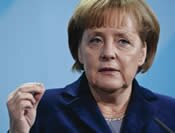Inflight Magazine of Brussels Airlines
Welcome to the Inflight Magazine of Brussels Airlines
Business trends
Image Corbis, Getty Images, Rex Features
Boyd Farrow rounds up what’s happening in the business world across Europe
Ice cream of the crop
 Bologna’s Gelato University sees enrolments double in economic crisis
Bologna’s Gelato University sees enrolments double in economic crisis
It seems people from all over the world are flocking to the Italian town of Bologna to learn the secret of making great ice cream. More than 6,000 attended the €700-a-week courses offered by the city’s Gelato University in 2008, and enrolments nearly doubled last year. Students come from as far afield as Australia, China, Sudan and Lebanon to learn how to make the world’s best gelato in the institute’s high-tech laboratories, and then use their expertise to open gelaterie in their own cities.
Established in 2003, the university is an off-shoot of Carpigiani, an Italian company that manufactures about 70% of the world’s ice cream-making machines. According to Patrick Hopkins, the American director, more and more people who’ve been hit by the economic crisis want to create a new future for themselves. Many students, he says, are senior businesspeople who’ve lost their jobs. The university runs six courses, from beginner to advanced.
 Ad-ded value?
Ad-ded value?
Spanish government allows extra airtime for telepromotions
Spain’s recession-battered broadcasters are flouting EU laws by allowing ‘telepromotions’ – features that blur the boundaries between programming and advertising – to play for over and above the 12 minutes of commercial airtime that’s legally permitted each hour.
Telepromotions masquerade as TV content while communicating clear commercial messages, and are part of the marketing mix for major marketers such as Procter & Gamble, Yoplait, Vodafone, Playtex and Unicef. For the first 30 seconds of a telepromotion, the brand is not mentioned, but it is then brought in to the content and the word ‘telepromotion’ appears in the corner of the screen. As of 19 December 2009, the EU has allowed 12 minutes of advertising per hour in member states. The Spanish government, however, has unilaterally added another two minutes for telepromotions, as well as five minutes for a TV channel’s own self-promotion. Originally, the government wanted to allow a full 12 minutes of telepromotions, but thanks to lobbying by the World Federation of Advertisers (WFA) and the Asociación Española de Anunciantes (AEA), as well as pressure from the EU, this has been reduced to two minutes. As part of the campaign, Spain’s ad industry created a ‘Not another minute of TV advertising’ website: www.niunminutomasdepublientele.com.
 Beware the wives of March
Beware the wives of March
Berlusconi’s family wrangling could prove costly
It could be an expensive month for Italy’s Silvio Berlusconi, who’s in the throes of thrashing out a divorce settlement with his estranged wife, the former actress Veronica Lario. Ms Lario is said to be demanding €43m a year in maintenance – or just over €3.5m a month – while Berlusconi’s lawyers are suggesting a maximum of €300,000 a month. Moreover, Corriere della Sera reported that the prime minister had threatened to deprive his wife of her mansion (the €80m Villa Belvedere, near Milan) if no agreement is reached on maintenance and the division of properties in Milan, Sardinia, London, Bermuda and New York.
Berlusconi’s wealth is estimated at between €5bn and €8bn. He is known to have wanted to avoid a court battle over the division of his legacy between his children by Lario and those by his first wife, Carla. Berlusconi has two children from his first marriage – Marina, 43, and Piersilvio, 40 – and three by Lario – Barbara, 25, Eleonora, 24 and Luigi, 21. He is reported to want to divide his legacy between his families, whereas Lario is thought to want the fortune to be split equally between the children. Lario’s three children are members of the board of Fininvest, Berlusconi’s holding company, with a 7.5% stake each. Berlusconi holds 60% and the rest is divided between his eldest children.
 Driving change
Driving change
BMW bucks the auto industry downturn trend
BMW Group, the world’s largest manufacturer of luxury cars, has announced that it is likely to increase earnings this year, boosted by new vehicles and a sales rebound in the US and Germany. The Munich-based maker of BMW, Mini and Rolls-Royce cars predicted that it will “grow profitably” because of models such as a new version of the 5 Series Sedan, which reaches showrooms in March, and the Mini Countryman crossover. Deliveries are forecast to rise by a “single-digit” percentage range this year to more than 1.3m cars and sport-utility vehicles. Chief executive Norbert Reithofer added that BMW intends to to retain its lead in luxury car sales, fending off challenges from Daimler AG’s Mercedes-Benz and Volkswagen’s Audi.
Global auto markets are likely to grow 2% to 53.3m vehicles in 2010 as a rebound in North America offsets a drop in western Europe, according to analyst IHS Global Insight. Luxury car makers are also predicting a recovery in demand, after they failed to benefit from last year’s government sales incentives that helped mass market manufacturers. Germany’s car industry association is much gloomier, however, saying that the domestic market will contract in the absence of incentives.
 Engine trouble
Engine trouble
Google facing opposition in Germany and Italy
Google may have been making headlines with its problems in China, but it could be heading for bigger difficulties in Europe, where it’s by far the largest search engine. German newspaper and magazine publishers have been wailing to competition authorities that all their websites together earn only about €100m a year from ads, while Google earns €1.2bn from search ads in the country. Meanwhile, chancellor Angela Merkel is being urged to consider a new kind of copyright to protect journalistic content on the web, which could require Google to buy special licences to cite content published elsewhere. The German government also objected to Google’s US legal settlement with authors and publishers, which aims to make millions of out-of-print works that are still under copyright available for sale in digital form. Finally, several German towns have moved to block Google taking pictures of their homes and businesses for the Street View service.
Things are no more harmonious in Italy. Prime minister Silvio Berlusconi has proposed a law making online video services such as Google’s YouTube liable for invasions of privacy (hardly helped by the site posting footage of the premier being attacked with a plaster souvenir), violations of copyright and other transgressions that occur in user-generated content. Google is also contesting a copyright lawsuit from Berlusconi’s Mediaset, the largest commercial television broadcaster in Italy.
 Net gains
Net gains
Online shoppers in Europe catching up with Brits
Online retail sales are set to increase by almost 20% in Europe this year, although the rate of expansion will slow when compared with 2009. A study by price comparison website Kelkoo and the Centre for Retail Research predicted that e-commerce revenues in the region will climb by 19.6%, to €178bn, in 2010. This follows on from an improvement of 22% in 2009, and means that 5.5% of retail returns will be attributable to the internet this year, up from 4.7% over the previous 12 months. Growth rates will reach 36% in Poland, 31% in France and 25% in Spain, despite the impact of the economic downturn. By contrast, the UK will record an uptick of just 12.4%, although the country will remain the most valuable across the continent in 2010.
Germany generated revenues of €32.7bn in 2009, followed by France on €24.2bn, with these two countries and the UK being responsible for 70% of regional e-commerce sales in this period. At the other end of the spectrum, Poland delivered just €2.4bn, with Finland on €2.53bn and Norway on €3.2bn. In terms of typical expenditure per person, the UK again topped the charts, on €1,212, followed by Denmark on €1,186 and Norway on €1,073.
The mean regional figure was €833.
 Megha investment
Megha investment
Escada receives facelift from new owner
Upscale fashion brand Escada plans to expand throughout Asia and launch new collections in an aim to get back into profit. “Maybe we can make a profit this year. If not, then 2011,” said Megha Mittal, the new owner of the formerly bankrupt Munich-based company, speaking to Frankfurter Allgemeine Sonntagszeitung. “We are thinking about new products. Cosmetics, for example. A relaunch of children’s fashion is possible, and I also dream of a men’s line,” added the 33-year-old daughter-in-law of Indian-born steel magnate Lakshmi Mittal, who is worth around €13bn. Megha reportedly paid €60m for Escada, and now says she wants to invest more then €30m in the company and keep more than 90% of the global work force of around 2,200, including the design team.
Escada’s chief executive Bruno Saelzer has extensive experience with men’s fashion: he joined in 2008 from Hugo Boss (where he was CEO) after a dispute with the company’s investor, the private equity house Permira.
He has said he would like to keep Escada firmly in the luxury camp, but to make it more affordable, offering more daywear rather than the glamorous evening gowns the brand was once known for.
The 34-year-old company operates 182 of its own shops and 225 franchise stores in more than 60 countries worldwide. Of course, it helps that Mittal herself is the company’s biggest customer. Rumour has it that she has bought – and paid for – more than €50,000 worth of Escada clothing.
 Small wonders
Small wonders
Handy new computers
While the world apparently goes iPad crazy, it’s worth drawing your attention to a couple of other mini-computers-cum-smartphones that are perfect for business travellers. Take the Nokia 3G Booklet, which isn’t a smartphone but has a SIM slot, accelerometer and GPS built in – rather like most recent launches in this category, including the iPhone and Nokia’s own N97. The Booklet’s 10.1in screen, reduced-size chiclet keyboard, Atom processor and 1GB RAM clearly put it in netbook territory, but at €725 – around double the price of other netbooks – it will appeal to those business travellers who want something slim, brushed aluminium (rather like the Apple Macbook Pro models) and a sexy glass screen. Nokia claims a battery life of 12 hours, and the Booklet weighs just 1.25kg. It also runs Windows 7.
Alternatively, it’s definitely worth checking out the new PsiXpda (www.psixpda.com), a powerful and stylish Psion-like device that’s billed as ‘your ultimate pocket computer’. It’s roughly two-thirds shorter than most netbooks, and weighs just 430g. In fact, it may just be the best €500 you’ve ever spent.
 Working for a brighter future
Working for a brighter future
Eminent scientist explains why photonics has such potential
Hugo Thienpont is a scientist with a soft side. Currently chair of the Applied Physics and Photonics department at Vrije Universiteit Brussel (VUB) and a potential candidate for the Nobel Prize, he has his sights firmly fixed on creating a safer world. Speaking to b.there! before the SPIE Photonics Europe event, to be held at the Square Conference Centre in Brussels from 12-16 April, he explains the world of photonics, and how he’s spearheading the programme to link academic research in this field with industry.
“On a very simple level, photonics is a unique technology that uses light to address today’s cultural difficulties,” Thienpont says. He continues in the context of global warming: “We all know what it is, but solving it is a very different matter. We need to develop more efficient lighting, and we can do this with photonics. With LEDs (light-emitting diodes) we can reduce the amount of electrical power we use and still create the same amount of optical light, and they are more durable – lasting 50,000 hours rather than an old bulb’s capacity of 1,000-2,000 hours – so we need to replace them less often.”
Thienpont expands by talking about projects in Africa: “We’re trying to make devices that detect E. coli in water. Hundreds of thousands die a year from this bacteria, so if we can make low-cost components that, using light and optical spectroscopy, can detect it, people will know the when water isn’t safe.”
The technology even has applications for our everyday shopping. “We are finding more frequently that food sold at a high price might actually be rubbish,” says Thienpont. “Take olive oil, for example. We are currently developing micro-systems that could be integrated into your mobile phone, along with the relevant software, that would allow you to analyse whether the olive oil was from Umbria or Greece, or whether it was a mixture of olive oil and lower-quality oils.” He adds that this is possible by passing light through the sample, and the software will then analyse the spectrum it receives back.
Speaking about his aim for the forthcoming Photonics Europe event, Thienpont says he wants to convey the message to industry that optics and photonics is the technology of the future. “We need to bring together industry, entrepreneurs and those that can provide funding to solve the challenges that we face. We need to extend the functionality of today’s products and make the technology ubiquitous; it’s about lowering the cost and improving the quality of life.” www.photonicseurope.org
Leave a Reply
